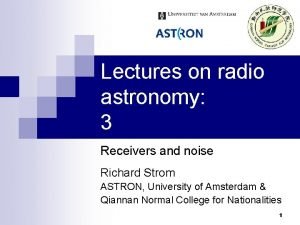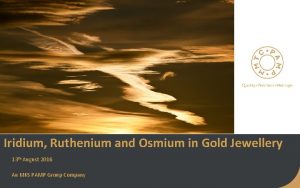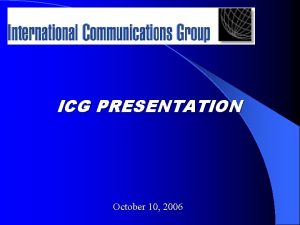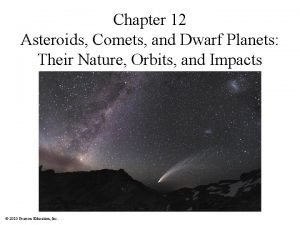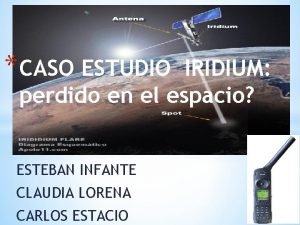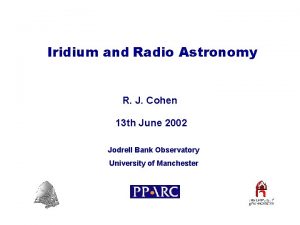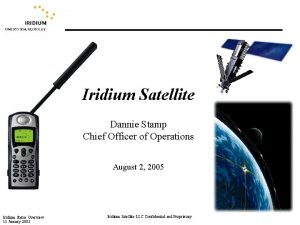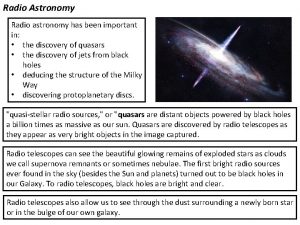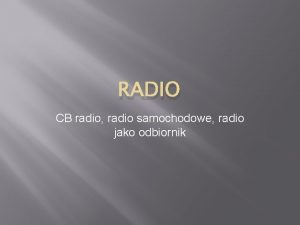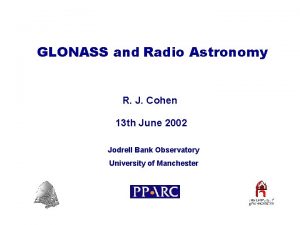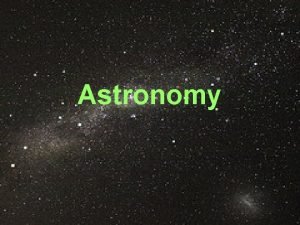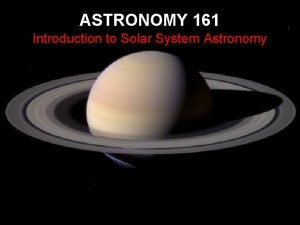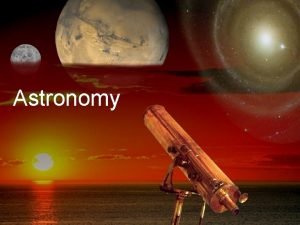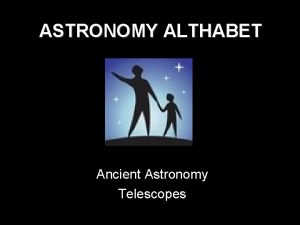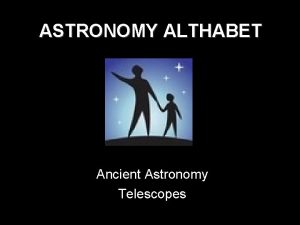Iridium and Radio Astronomy R J Cohen 13
















- Slides: 16

Iridium and Radio Astronomy R. J. Cohen 13 th June 2002 Jodrell Bank Observatory University of Manchester

Potted History of Iridium in Europe 1991 August visit by Iridium to Jodrell Bank: downlink problem; beacon; go see CRAF 19921991 October presentation to WP 7 D in Geneva: beacon; filters; -238 acheivable by high-tech? 1992 WARC-92 allocates Iridium downlink (secondary) 19931994 June, Iridium-NRAO MOU signed; blanker 1995 -7 Strong attempts to force an Iridium-UK MOU based on NRAO agreement; mitigation? factors; 1995 -7 European discussions in SE 28 (CEPT) but no technical solution; discussion with CRAF (& EC) 1998 July ESF-Iridium MOU signed (political)

Technical Discussions in SE 28 • Protection of GLONASS • Protection of Inmarsat above 1626. 5 MHz • CDMA vs. TDMA for Geostar, Iridium, etc. • MSS downlink and RAS: the “killer problem” • RAS beacon (one is already one too many) • MES coordination zones around observatories (Monte Carlo approach: now ITU-R Rec. M. 1316) • MES in aircraft • 10% criterion for propagation is not 10% data loss for the RAS (now ITU-R Rec. RA. 1513)

European Issues for RAS Large European radio telescopes use 1612 -MHz band heavily (30% of time at Nancay) Nancay transit instrument: long-term monitoring programmes cannot survive 4 -hr downtime daily Unique imaging: MERLIN & EVN resolve OH shells Regional agreement essential since 1612 -MHz band is used in many small countries (< Iridium beam) United we stand; divided … RAS had recently survived Locstar GLONASS “clean-up”, band partly ~usable again


OH-IR Sources: an endangered species Short-lived phase in late stellar evolution, only visible in IR and at 1612 MHz (OH maser transition). Evolutionary sequency of mass-loss. IRAS catalogue contains ~104 candidates. Radio gives V* , Vexp , shell-size, mass-loss, distance: • OH maser shells: maps give angular diameter. • Monitoring gives phase-lag = diameter. • Hence get distance, scale size of Galaxy. Orbital velocities give mass of GC black hole. Polarization gives circumstellar magnetic field.

OH Maser pumped by IR from variable star

Phase-lag between two OH peaks (near and far sides of shell)

OH 1612 -MHz polarization traces magnetic field

Other European Science at 1612 MHz OH 1612 MHz maser in star-forming regions OH 1612 MHz thermal emission from dust clouds OH 1612 MHz absorption from molecular clouds Observations of 4 OH lines at 1. 6 GHz give physical conditions Red-shifted OH megamasers Weak OH masers in comets MERLIN continuum observations for multi-frequency synthesis (not “sanctioned” by Iridium, since band is mainly for spectral line observations) Pulsar observations (can be done in another band)

Mitigation Factors for RAS? Radio telescope sidelobe level – 10 d. Bi Detector sensitivity (1 -bit sampler at Jodrell) Elevation angle: receiver noise, satellite visibility etc. Baseline subtraction: leaves only differential power and may add noise through reference spectrum Polarization discrimination RAS need is not full time (Astronomers can wait) Blanker will deal with RFI at peak traffic times (% loss) Radio astronomers should try harder to subtract RFI

Lovell Telescope • • 250 ft fully steerable Prime focus 150 MHz – 5 GHz Upgrade in progress

Adaptive Cancellation Adaptive Interference Cancelling Barnbaum & Bradley R. Fisher VU 1998 AJ, 115, 2598 • A Conceptual View of Adaptive Interference Cancelling

Unforeseen Developments Spikes in broadcast signal (not simulated or mentioned before tests) Operation of 1616 -1626. 5 MHz over Europe, with no notice or permission GSM growth, especially in Europe Technical hitches (poor building penetration, heavy terminals, etc. ) Bankruptcy

Global Interference from the sky www. atnf. csiro. au/ska/intmit Signal strength These peaks also change frequency as the satellite moves across the sky Signal levels of brightest* celestial radio sources ITU permitted average level MHz ITU frequency allocation to Radio Astronomy * Signals from early Universe are 100 billion times weaker IRIDIUM satellite: measured 1998

Personal Observations GLONASS united astronomers; Iridium divided them. Non-disclosure agreements = gagging. Regulatory arguments did not help, nor did technical arguments: Iridium was always going to fly. The publicity did us no harm. In practice the MOUs have been of limited use to us. Iridium were shameless: what right had they to tell RAS when and what they can observe? Where was IUCAF? Iridium sidestepped IUCAF. Iridium learned a lot about us: beware next time.
 Learning astronomy by doing astronomy activity 1 answers
Learning astronomy by doing astronomy activity 1 answers Learning astronomy by doing astronomy activity 7 answers
Learning astronomy by doing astronomy activity 7 answers Learning astronomy by doing astronomy activity 1 answers
Learning astronomy by doing astronomy activity 1 answers Bram cohen jenna cohen
Bram cohen jenna cohen Astronmo
Astronmo Radio astronomy lectures
Radio astronomy lectures Osmium hustota
Osmium hustota How to detect iridium in gold
How to detect iridium in gold Aerorouter
Aerorouter Jupiter nudges the asteroids through the influence of
Jupiter nudges the asteroids through the influence of Caso iridium
Caso iridium Link3
Link3 Daniel mahzonni
Daniel mahzonni Ni3 lewis dot structure
Ni3 lewis dot structure Iridium
Iridium Iridium kankernetwerk
Iridium kankernetwerk Iridium
Iridium





